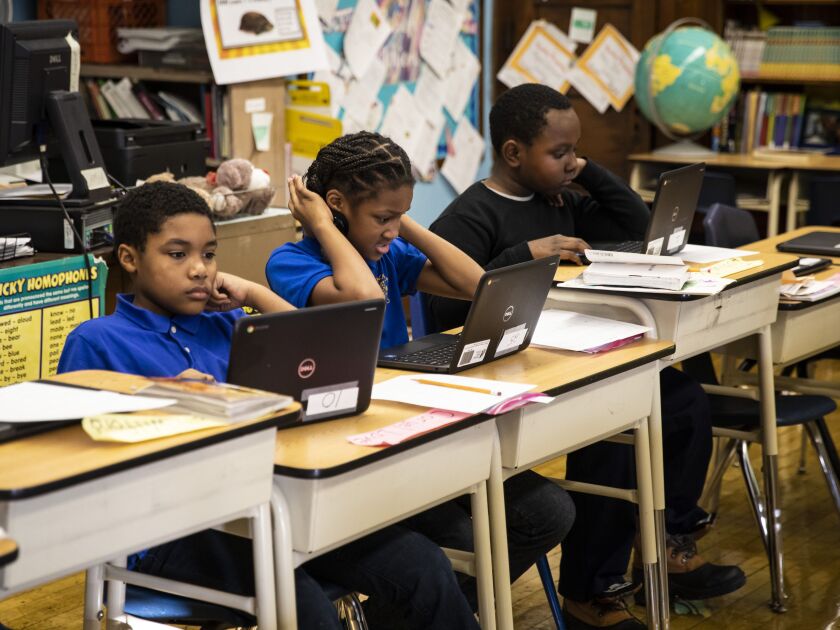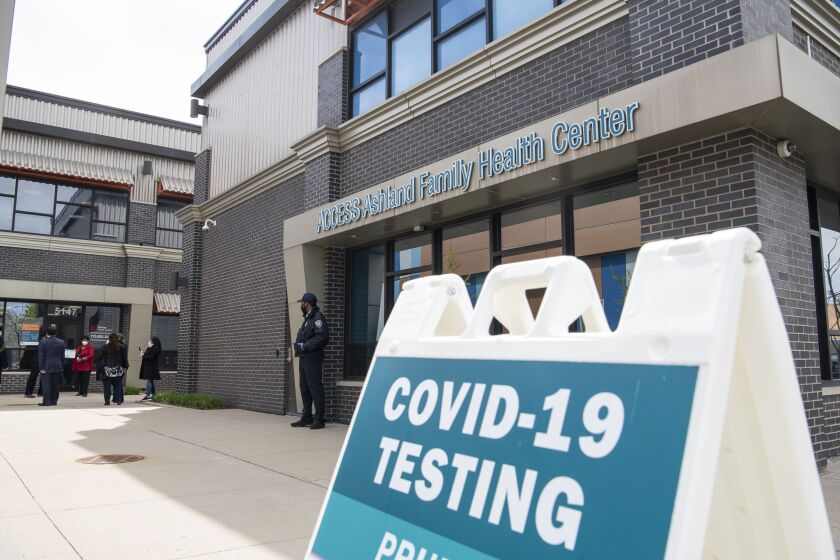Illinois’ rebound in coronavirus cases hit another apex Friday as health officials announced another 1,941 people tested positive for COVID-19.
That’s the state’s highest single-day caseload since May 24 — eclipsing the two-month high tally set a day earlier.
The fight against the coronavirus is far from over. Here’s what happened Friday in Illinois as the state continued its battle with the coronavirus.
News
8:55 p.m. CPS asks parents to decide in next week whether to send kids to school for in-person classes
Chicago Public Schools parents are being asked to decide in the next week whether to send their children to school part-time this fall or keep them home with only one day of live instruction online.
The choice is a monumental one for most families as they figure out how to balance their children’s education with the health risks of gathering in groups during a deadly pandemic. Yet it’s now one they have to make a month before school would resume without knowing the state of the virus in the city at that time, or exactly what the district’s final fall plan looks like.
Officials sent messages to parents Friday afternoon revealing an Aug. 7 deadline for that decision, explaining the district will need time to plan based on how many families decide to stick with remote learning.
“The district’s approach for delivering full-time home-based learning will be tailored to the number of families who choose this option,” the email from CPS chief executive Janice Jackson and education chief LaTanya McDade read.
With little known about the direction of the virus between now and Sept. 8, when the school year is set to start, it may be tough for families to make an educated decision. CPS also on Friday held its last of five community meetings to take input on its fall framework, and is yet to issue its final plan for the fall.
Read the full story from reporter Nader Issa.
8:33 p.m. Chicago bars can start serving customers outside — even if they don’t serve food
Bars that that had been closed again to indoor service after a surge of coronavirus among young people have gotten a little help from the city.
New guidelines announced Friday will make it a little easier far bars and taverns that don’t serve food to set up places for customers to drink outside.
As of Friday, businesses that serve alcohol without a retail food license may apply to temporarily operate on their front sidewalk through and expansion of the city’s outdoor dining program, the mayor’s office announced.
Reporter Emmanuel Camarillo has the full story.
6:58 p.m. Illinois reports highest single-day COVID-19 caseload since May
Illinois’ rebound in coronavirus cases hit another apex Friday as health officials announced another 1,941 people tested positive for COVID-19.
That’s the state’s highest single-day caseload since May 24 — eclipsing the two-month high tally set a day earlier.
The latest cases were confirmed among a record 49,782 tests received by the state, but it was still enough to raise Illinois’ rolling positivity rate over the past week to 3.9%.
That number, which indicates how quickly the virus is spreading, was 2.6% at the end of June.
The state hasn’t topped 2,000 cases since late May, when the state suffered its peak COVID-19 impact, reporting an average about 2,100 new cases and 100 deaths per day.
And after the Illinois curve flattened through June, Gov. J.B. Pritzker has sounded the alarm on a steady case increase in recent weeks. On Thursday, he warned the state is “at a danger point,” on the precipice of a massive coronavirus flareup like those seen in many other states.
Read the full report with the latest numbers here.
5:26 p.m. Feds get ready to take a big step at Dirksen courthouse — where there’s a jury trial Monday
For the last two months, Chicago’s federal courthouse has slowly been trying to get back to business.
Arraignments and sentencing hearings have gone forward after long delays. Some occurred by video, others with masks and social distancing. But whenever the question of jury trials has come up, judges have wondered the same thing out loud: If summoned, will jurors appear?
It looks as if they’re about to get their answer. An Ottawa man is set to go to trial Monday on charges alleging he repeatedly threatened federal officials who sought him out following angry remarks made on Instagram toward Nikki Haley, then the U.S. ambassador to the United Nations.
The criminal jury trial of Robert Haas, 40, appears to be Chicago’s first since the coronavirus pandemic began. It also seems full of pitfalls. One attorney involved in the case recently told the judge “I don’t feel safe” and asked for extra precautions. Haas, representing himself, has been warned against making certain comments to jurors about the virus. And Gov. J.B. Pritzker warned just days ago of a new round of closures as COVID-19 cases tick back up — with a federal court security officer among the recently diagnosed.
Reporter Jon Seidel has the full story.
2:50 p.m. Lost on the frontline: These Chicago, suburban health workers lost their lives to COVID-19
America’s health care workers are dying. In some states, medical personnel account for as many as 20% of known coronavirus cases. They tend to patients in hospitals, treating them, serving them food, cleaning their rooms. Others at risk work in nursing homes or are employed as home health aides.
“Lost on the Frontline,” a collaboration between KHN and The Guardian, so far has identified 878 such workers who likely died of COVID-19 after helping patients during the pandemic.
These, from the Chicago area, are some of them, confirmed by family members, employers and medical examiners.
Read the profiles of locals we lost to COVID-19 here.
11:31 a.m. What Chicagoans think of Lori Lightfoot tightening COVID rules on bars, restaurants, gyms
We asked Chicagoans: What do you think of Mayor Lori Lightfoot’s decision to tighten restrictions on bars, restaurants and gyms after the COVID-19 spike among young people? Some answers have been condensed and lightly edited for clarity.
“She’s been given no other choice. She needs to keep the citizens safe. I’m not thrilled but thankful it’s not worse.” — Brice Notardonato Ellett
“Excellent! She follows the science, and that’s what keeps us safe. I really trust her.” — Chris Rutledge
Read more reader responses here.
9:18 a.m. Chicago jazz icon calls early days of quarantine ‘the worst moment that I can ever remember’
Until March, Chicago-based jazz pianist Erwin Helfer was playing shows at the Hungry Brain in Lakeview every Tuesday night and offering piano lessons.
Then, the pandemic hit. Within weeks, he was hospitalized — not from COVID-19 but from what experts say is likely to become a significant side-effect of the pandemic. Helfer fell into a deep and debilitating depression.
“Along came the pandemic, and, at that moment, my life became very difficult,” he says.
On March 10, he played his last gig at the Hungry Brain.
Then, Helfer, who lives alone and, because of his age, is in a high-risk group for the coronavirus, began quarantining at his Lincoln Park home.
The absence of social interaction brought on by the stay-at-home order almost immediately began taking a toll on his mental health.
A close friend, Ivan Handler, picked him up at his home on May 8 and took him to Rush University Medical Center’s psychiatric ward, where Helfer was admitted. Diagnosed with severe depression, he remained there for six weeks.
“In the first three days I was there, I was looking for a window to jump out, seriously. I was taking a certain amount of drugs, I don’t know what they were, and I wasn’t getting much better.”
Read the full story from Caroline Hurley here.
8:02 a.m. Coronavirus-stricken woman gets lung transplants after mother travels to Chicago to say ‘goodbye’
Mayra Ramirez described her worst moment — when she was close to death and her mother had been told to catch the first flight to Chicago to come say goodbye.
As Ramirez spoke Thursday, her mother sat a few feet away, silent, most of her face and her outward emotions hidden behind a surgical mask.
“What hurts the most is knowing everything my family went through during the time I was intubated,” said Ramirez softly, as she appeared with the team of Northwestern Memorial Hospital doctors who ensured her mother never had to utter that awful word, “Goodbye.”
Ramirez, 28, of Chicago, and Brian Kuhns, a 62-year-old mechanic from Lake Zurich were both Northwestern patients who made history: They were the first in the nation to receive double-lung transplants after the coronavirus destroyed those organs.
Ramirez, a paralegal who moved to the city from North Carolina six years ago, told reporters that she’d been careful when the pandemic swept through. She stayed home mostly, but still got sick. In April, she called her doctor after she lost her sense of taste and smell — and felt excessively tired. When she had fainting spells later that same month, she came to Northwestern’s emergency room.
“I was asked who would be making my medical decisions for me,” Ramirez explained. Her mother, she said. A few minutes later, she was being hooked up to a ventilator. The next few weeks were a blur with Ramirez often unable to distinguish reality from her frequent nightmares.
Get the full story from reporter Stefano Esposito here.
New cases
- Illinois’ rebound in coronavirus cases hit another apex Friday as health officials announced another 1,941 people tested positive for COVID-19.
- Herman Cain, former Republican presidential candidate and former CEO of a major pizza chain who went on to become an ardent supporter of President Donald Trump, has died at age 74 of complications from the coronavirus.
Analysis & Commentary
2:44 p.m. Is a college football season worth it?
If college football somehow makes it to the field, all we’ll get is a shell of a season.
Fewer games. Conference bubbles. A limited number of fans in the stadiums — or maybe none at all.
Is it really worth risking the health of players, coaches and boosters for this?
The mighty Southeastern Conference, which has produced 10 of the last 14 national champions, delivered the grimmest signal Thursday that this will be a season like no other, if there’s actually a season amid a raging pandemic that shows no signs of fading away.
Following drastic moves already instituted by the Big Ten, Pac-12 and Atlantic Coast Conference, the SEC announced a 10-game, conference-only schedule that won’t begin until late September. The Big 12 will likely have to follow suit, despite making an aggressive push to play a full, 12-game schedule even as the pool of potential non-league opponents dries up.
The reduced, bubble-like schedules are effectively a Hail Mary to save a season that, frankly, may not be worth saving at this point.
8:04 a.m. Toilet troubles worsened by COVID crisis
Tim Pyle, executive director of the American Restroom Association, recently got an urgent email from Wichita alerting him that the bathroom at the bus station downtown was closed to the public; could the ARA help?
While the Baltimore-based group is not intended to address individual shuttered toilets across this great land, Pyle responded sympathetically.
“Municipalities and governments have dropped the ball in the past 20 years, and have abdicated their responsibilities to store owners, gas stations, and eateries,” he wrote. “Now that COVID has hit, it is more important than ever for ‘public’ facilities to do their part and keep them open.”
Which is separate from the issue of whether people should even go into public restrooms that are open. Public bathrooms are perfect virus spreaders. Strangers gather in the smallest space possible. They perform functions that are then rendered into whirling vortexes of airborne contamination, thanks to flushing toilets, and blasted through the room by hand dyers.
Two related problems then: keeping bathrooms open, and improving their safety.






